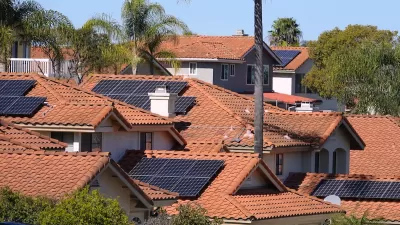Energy storage is acknowledged by many as a missing link of renewable energy, particularly by those quick to cite the intermittency of solar and wind power. A new solar thermal plant in Arizona stores energy in the form of heat for peak hour needs.
Matthew L. Wald writes about "a closely watched new solar project called Solana" in the Arizona desert built by Abengoa Solar. Unlike conventional solar plants that produce electricity for transmission to energy-hungry, metropolitan markets, Solana is also a cutting-edge, energy storage facility relying on "huge tanks of molten salt" to store heat from its "sprawling network of parabolic mirrors...in a three-square-mile patch of desert". It will sell its renewable energy, including the electricity it produces at night, to the utility, Arizona Public Service.
When the sun has set, the plant can draw heat back out of the molten salt to continue making steam and electricity...The emerging technology is one way that the utility industry is trying to make electricity from the sun available even when it is not shining, overcoming one of the major shortcomings of solar power.
If you thought that energy storage was solely the province of batteries, think again. Wald writes that "several (renewable power) plants have added banks of electric batteries. But battery storage is so expensive that these have been used mostly to smooth the output of the plant, not to store huge amounts overnight."
Batteries work great in electric cars because of the relatively high cost of gasoline. Solar has to compete with much cheaper power from coal and natural gas.
In neighboring California, another breakthrough of sorts is being watched, though this one is regulatory.
"In a bold move being closely watched by utilities, environmentalists and the clean technology industry, California on Thursday [Oct. 17] adopted the nation's first energy storage mandate", writes Dana Hull of the San Jose Mercury News.
(The) California Public Utilities Commission unanimously approved (a) groundbreaking proposal [PDF] that requires PG&E, Southern California Edison and San Diego Gas & Electric to expand their capacity to store electricity, including renewable energy generated from solar and wind.
"Storage really is the game changer in the electric industry. And while this new policy is not without risk, the potential rewards are enormous," said Commissioner Mike Florio.
Solar advocates will not be the only ones watching the Solana plant. With a $1.45 billion loan guarantee from the Department of Energy, skeptics will also also be tracking its progress.
FULL STORY: Arizona Utility Tries Storing Solar Energy for Use in the Dark

Planetizen Federal Action Tracker
A weekly monitor of how Trump’s orders and actions are impacting planners and planning in America.

Map: Where Senate Republicans Want to Sell Your Public Lands
For public land advocates, the Senate Republicans’ proposal to sell millions of acres of public land in the West is “the biggest fight of their careers.”

Restaurant Patios Were a Pandemic Win — Why Were They so Hard to Keep?
Social distancing requirements and changes in travel patterns prompted cities to pilot new uses for street and sidewalk space. Then it got complicated.

Platform Pilsner: Vancouver Transit Agency Releases... a Beer?
TransLink will receive a portion of every sale of the four-pack.

Toronto Weighs Cheaper Transit, Parking Hikes for Major Events
Special event rates would take effect during large festivals, sports games and concerts to ‘discourage driving, manage congestion and free up space for transit.”

Berlin to Consider Car-Free Zone Larger Than Manhattan
The area bound by the 22-mile Ringbahn would still allow 12 uses of a private automobile per year per person, and several other exemptions.
Urban Design for Planners 1: Software Tools
This six-course series explores essential urban design concepts using open source software and equips planners with the tools they need to participate fully in the urban design process.
Planning for Universal Design
Learn the tools for implementing Universal Design in planning regulations.
Heyer Gruel & Associates PA
JM Goldson LLC
Custer County Colorado
City of Camden Redevelopment Agency
City of Astoria
Transportation Research & Education Center (TREC) at Portland State University
Camden Redevelopment Agency
City of Claremont
Municipality of Princeton (NJ)





























